|
De Zuid-Afrikaanse schrijver André
Brink werd geboren op 29 mei
1935 in Vrede. Zie ook mijn blog van 29 mei 2007
en ook mijn blog van 29 mei 2008.en ook mijn blog van 29 mei 2009 en ook mijn blog van 29 mei
2010.
Uit: A dry white
season
It all really began, as far as Ben
was concerned, with the death of Gordon Ngubene. But from the notes he made
subsequently, and from newspaper cuttings, it is obvious that the matter went
back much further. At least as far as the death of Gordon's son Jonathan at the
height of the youth riots in Soweto. And even beyond that, to the day, two years
earlier -- represented in Ben's papers by a receipt with a brief note scribbled
on it when he'd started contributing to the schooling of the then fifteen year
old Jonathan.
Gordon was the black cleaner in the
school where Ben taught History and Geography to the senior classes. In the
older journals there are occasional references to "Gordon N." or just "Gordon";
and from time to time one finds, in Ben's fastidious financial statements,
entries like "Gordon -- R5.oo"; or "Received from Gordon (repayment) -- R5.00",
etc. Sometimes Ben gave him special instructions about notes on his blackboard;
on other occasions he approached him for small personal jobs. Once, when some
money disappeared from the classrooms and one or two of the teachers immediately
blamed Gordon for it, it was Ben who took the cleaner under his wing and
instituted inquiries which revealed a group of matric boys to be the culprits.
From that day Gordon took it upon himself to wash Ben's car once a week. And
when, after Linda's difficult birth, Susan was out ofaction for some time, it
was Gordon's wife Emily who helped them out with housework.
As they came to know each other
better Ben discovered more about Gordon's background. As a young boy he had
arrived from the Transkei with his parents when his father had found employment
in the City Deep Mine. And since he showed interest in reading and writing from
an early age he was sent to school -- no cheap or easy undertaking for a man in
his father's position. Gordon made steady progress until he'd passed Standard
Two, but then his father died in a rockfall in the mine and Gordon had to leave
school and start working to supplement his mother's meagre income as a domestic
servant.
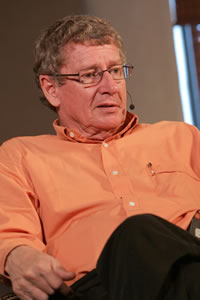
André Brink
(Vrede, 29 mei 1935)
De Catalaanse dichter, schrijver en vertaler Eduard Escoffet werd geboren op 29 mei 1979 in Barcelona in 1979. Zie ook mijn blog van 11 juni 2009 en ook mijn blog van 29 mei
2010.
there is the
woman
there is the woman that listens to
you and there is the other.
there is the woman that, with the night, dulls
the moon and you find her, and there is the other.
there is the woman that
you see
and the other. and the one you would like to see... and the
other.
there is the woman, you seem to remember, that made you lose
sight
of the world and there is the other. then too
there is the woman that makes
you forget her and the other, she does too.
there is the woman and the wind,
at leisure, that are speech
and are words and a dream that walks. and flies.
and the other.
there is the woman that you would like to know and the
other.
there is the other and the woman you do not remember.
there is the
woman and the other that you would like
to forget. there is the woman without
eyes, that are
the barrels of wine in the dark of a sailboat that
has done
with the sea and has told you that mermaids
she has not seen. the other
neither. and there is the woman
that will cry that she has not touched the
fire,
that has her eyes covered and there is the other,
whose eyes you
have covered, and you too have
your eyes pulled from their sockets between
the mirror
and the light of the sun. there is the woman that mutters
and
there is the other. there is the woman that hangs out the washing
or arranges
the fragility of the world and there is the other.
there is the woman, made
flesh, that is in the light and is in the dark
and there is the other, in the
dark and in the light.
there is the woman and the sex. the sex, too. and the
other.
Vertaald door Graham
Thomson
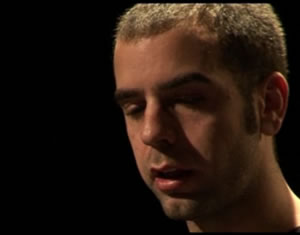
Eduard
Escoffet (Barcelona, 29 mei 1979)
De Engelse letterkundige, schrijver en journalist
Gilbert Keith Chesterton werd geboren in Londen op 29 mei 1874.
Zie ook mijn
blog van 29 mei 2007 en
ook mijn blog van 29 mei 2008 en ook mijn blog van 29 mei 2009 en ook mijn blog van 29 mei 2010.
Uit: Father
Brown. The Essential
Tales
It is due to him to say that his
fantastic physical strength was generally employed in such bloodless though
undignified scenes; his real crimes were chiefly those of ingenious and
wholesale robbery. But each of his thefts was almost a new sin, and would make a
story by itself. It was he who ran the great Tyrolean Dairy Company in London,
with no dairies, no cows, no carts, no milk, but with some thousand subscribers.
These he served by the simple operation of moving the little milk cans outside
peoples doors to the doors of his own customers. It was he who had kept up an
unaccountable and close correspondence with a young lady whose whole letter-bag
was intercepted, by the ex- traordinary trick of photographing his messages
infinitesimally small upon the slides of a microscope. A sweeping simplicity,
however, marked many of his experiments. It is said that he once repainted all
the numbers in a street in the dead of night merely to divert one traveller into
a trap. It is quite certain that he invented a portable pillar-box, which he put
up at corners in quiet suburbs on the chance of strangers dropping postal orders
into it. Lastly, he was known to be a startling acrobat; despite his huge
figure, he could leap like a grasshopper and melt into the tree-tops like a
monkey. Hence the great Valentin, when he set out to find Flambeau, was
perfectly aware that his adventures would not end when he had found him.
But
how was he to find him? On this the great Valentins ideas were still in process
of settlement.
There was one thing which Flambeau, with all his dexterity of
disguise, could not cover, and that was his singular height. If Valentins quick
eye had caught a tall apple-woman, a tall grenadier, or even a tolerably tall
duchess, he might have arrested them on the spot. But all along his train there
was nobody that could be a disguised Flambeau, any more than a cat could be a
disguised giraffe. About the people on the boat he had already satisfied
himself; and the people picked up at Harwich or on the journey limited
themselves with certainty to six.
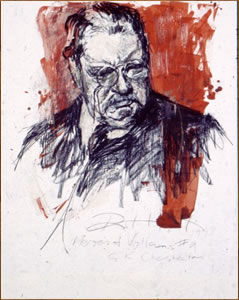
G. K. Chesterton (29 mei 1874 - 14
juli 1936)
Portret door Drew
Hewitt
De Hebreeuwse dichteres, schrijfster en letterkundige Leah Goldberg werd geboren in Königsberg (Pruisen) op 29 mei 1911. Zie ook
mijn blog van 29 mei 2007
en ook mijn blog van 29 mei 2008 en ook mijn blog van 29 mei 2009 en ook mijn blog van 29 mei
2010.
Uit:
PRAYERS
OF ATONEMENT
You came to me to open my
eyes,
your body a glance a window a
mirror,
you arrived as night comes to the
owl
to show him in darkness all
necessary things.
And I learned: a name for every
eyelash and nail
for every hair on flesh uncovered,
made light,
and the fragrance of childhood, of
resin and pine,
was the sweet fragrance of our
bodies' night.
If there were torments then they
voyaged toward you
my white sail on course toward your
dark night.
Now, allow me to leave, let me go,
let me go
to bow on the shores of
forgiveness.
Vertaald door Rachel Tzvia
Back
Der
morgige Tag
Heute ist das Grün sehr grün.
Und
das Grau sehr grau.
Ein wenig Schwarz, und kein Weiß in der Stadt.
Heute
ist der Verstörte sehr verstört.
Heute ist die Vergangenheit sehr
vergangen.
Ein wenig Zukunft. Und keine Gegenwart in der
Luft.
Und noch ist es nicht leicht zu
atmen, und noch ist es nicht leicht
Gegen den durchtriebenen Wind zu
denken.
Und es fällt gar nicht leicht zu warten.
Und der Sturm berührt die
Augenwimpern,
und in tausend Stücke zerbricht jeder Augenblick.
Aber heute
ist das Grün sehr grün.
Vertaald door Elad
Klein
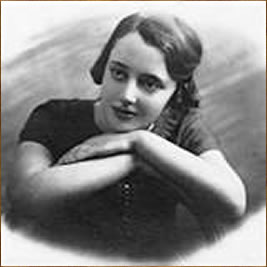
Leah Goldberg (29 mei 1911 15 januari 1970)
Getekend door
Yarival
De Iraanse filmregisseur en schrijver Mohsen Makhmalbāf
werd geboren op 29 mei 1957 in Teheran. Zie ook mijn blog van 29 mei
2010.
Uit: Houra (nymph,
script)
Airport, daytime:
A plane lands.
Teenage dark-skinned porters holding their carts, wait to rush towards
passengers stepping out of the plane. Among them, a weary old woman called Houra
comes down the stairs. A flight attendant holds her arm, helping her down.
Shanbeh, one of the teenage porters, spots Houra and goes toward her.
On
the streets, daytime:
Houra sits on Shanbehs cart, wearing a ring of thread
on each finger. Each thread acts as a reminder to buy something. Houra asks
Shanbeh to take her to the bazaar, so she can buy herself the furniture she
needs. Shanbeh asks her what she wants to buy. After consulting the threads on
her hand, the old woman says, A refrigerator. Shanbeh turns the cart around
and says, Then, we should go in the other direction.. Houra adds that she
needs a washing machine as well. Shanbeh changes direction one more time and
explains that they need to go to different places for each item she intends to
buy. He asks to know what else Houra wants to buy, and after a thorough
examination of the threads on her finger, Houra replies A bed, a dressing
table,
, but then tells Shanbeh how shed prefer to have a cup of tea first.
She takes out a teapot from her things, hands it over to Shanbeh telling him
what a good time theyd have were he to light a fire so they could have some
tea. Shanbeh makes a small pile of wood, fills the teapot with water, and puts
on the fire he makes. He asks the old woman who all that furniture is for, and
she tells him that its for herself. Shanbeh asks her why she wants all that
stuff at this stage in her life, while she might not have long left. Houra
recounts how she always wished to buy them buy never had the money, and in
answer to Shanbehs question of Where she got it from tells him of the
inheritance she received. She then remembers she has forgot to leave food and
water for her rooster at home and that the rooster could well die were she not
to hurry back home. She suggests leaving the tea to later and going after the
furniture before its late.
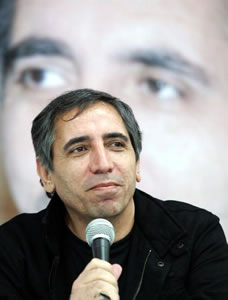
Mohsen Makhmalbāf (Teheran, 29 mei
1957)
De Oostenrijkse schrijver en theatercriticus
Hans
Weigel
werd
geboren op 29 mei 1908 in Wenen. Zie ook mijn blog van 29 mei 2009 en ook mijn blog van 29 mei
2010.
Gebundene Hände
Jedes Mal, jedes Mal, schwört man
sich zu,
das ist das letzte Rendezvous.
Doch man weiß, jedes Mal, dass man
s nicht tut,
hat man denn das Herz
dazu.
Zarah Leander
Gebundene Hände, das ist das Ende,
jeder verliebten Passion.
Es
spricht noch der Blick,
von Liebe und Glück,
und doch, weiß das Herz
nichts mehr davon.
Man sagt gern: verzeih,
so geben wir uns
frei,
du fühlst doch auch wie ich,
es ist vorbei.
Und doch, ohne
Ende,
tragen die
Hände,
Fesseln; der Liebe
Sklaverei.
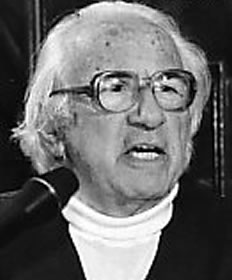
Hans Weigel (29 mei 1908
12 augustus 1991)
28-05-2011 om 20:13
geschreven door Romenu 
Tags:André Brink, G. K. Chesterton, Eduard Escoffet, Leah Goldberg, Mohsen Makhmalbā,f, Hans Weigel, Romenu
|
